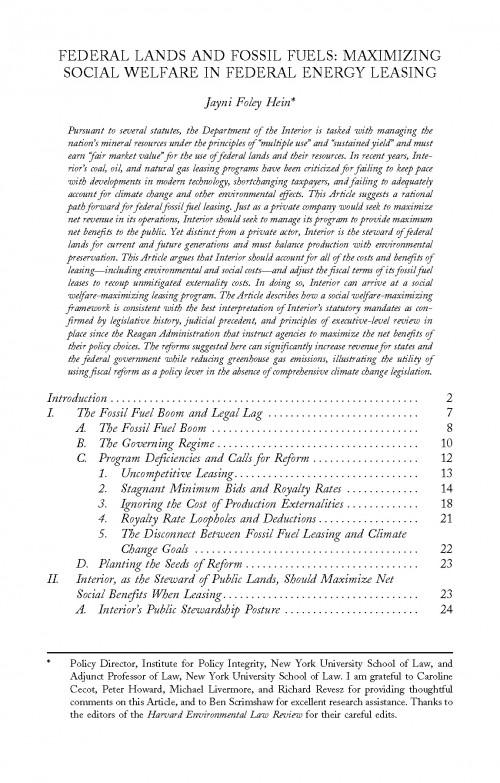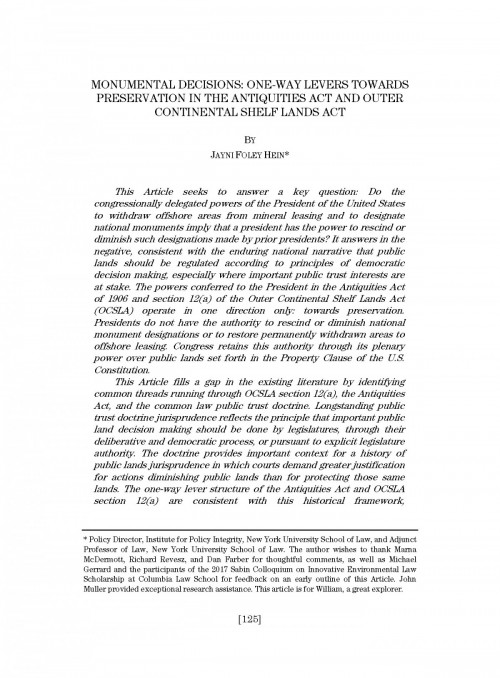-
Brief on the Clean Water Rule’s “Applicability Date”
The Environmental Protection Agency and Army Corp of Engineers were sued for suspending implementation of the Clean Water Rule through the addition of an “applicability date” to the Clean Water Rule. Our brief to the U.S. District Court for the Southern District of New York in that case argues that the court should vacate the Suspension Rule because the agencies improperly ignored the forgone benefits of suspending the Clean Water Rule.
-
Comments to EPA on Coal Combustion Residuals Rule
In 2015, the United States Environmental Protection Agency (EPA) established minimum criteria for the safe disposal of coal combustion residuals. At the time, EPA projected that the new rule would yield substantial health and environmental benefits. EPA now proposes to weaken the requirements of the 2015 rule but insists that doing so “will not change risks to human health and the environment” and thus will have no effect on the projected benefits of the 2015 rule. Our comments explain why EPA cannot reasonably assume that its proposed changes will have no effect on the 2015 rule’s projected benefits.
-
Comments to OSMRE on Failure to Use the Social Cost of Greenhouse Gases in a Federal Mining Plan
We recently submitted comments to Office of Surfacing Mining Reclamation and Enforcement (OSM) on its environmental assessment (EA) on modifying the federal mining plan for Bull Mountains Mine No. 1 in Montana. The EA evaluates a proposal to extend operations at an existing mine by nine years, which would produce an extra 86.7 million tons of coal. While the EA quantifies the tons of greenhouse gas emissions related to the project, OSM refused to use the social cost of greenhouse gases metric to monetize the climate effects of these emissions. Our comments explain why the agency’s refusal is arbitrary and unlawful in light of a growing body of case law, which holds that failure to monetize a project’s costs is impermissible if an agency justifies an action based on the project’s monetized benefits. Our comments also explain why the social cost of greenhouse gases metric is appropriate for projects of this scale, why the metric’s use is not limited to rulemakings, and how failing to adequately account for the project’s climate effects is a violation of NEPA.
-
Brief to Forest Service on Expansion of Colorado’s West Elk Coal Mine
The U.S. Forest Service continues to ignore climate damages in its final approval of a coal mine expansion in Colorado, despite a court ruling that asked the Forest Service to disclose the effects of greenhouse gas emissions from the expansion. In its final environmental impact statement (EIS) on the project, Forest Service quantifies how much the expansion will increase greenhouse gases emissions but only gives a generic description of climate change and its effects. By not quantifying and monetizing the effects of this increase in emissions, the EIS obscures information necessary for the public to appreciate how the expansion will result in hundreds of millions of dollars in climate damages. Our brief to the District Court of Colorado argues that Forest Service’s failure to monetize climate impacts was arbitrary and is still in violation of the National Environmental Policy Act.
-

Federal Lands and Fossil Fuels: Maximizing Social Welfare in Federal Energy Leasing
Published in the Harvard Environmental Law Review.
The Department of the Interior is tasked with managing the nation’s mineral resources and must earn a “fair market value” for the use of federal lands and resources. But in recent years, Interior’s coal, oil, and natural gas leasing programs have been criticized for failing to keep pace with developments in modern technology, shortchanging taxpayers, and failing to adequately account for climate change and other environmental effects. This article, published in the Harvard Environmental Law Review, suggests a rational path forward for federal fossil fuel leasing. Just as a private company would seek to maximize net revenue in its operations, Interior should seek to manage its program to provide maximum net benefits to the public, to whom public resources belong. This includes accounting for all of the costs and benefits of leasing—including environmental and social costs—and adjusting the fiscal terms of its fossil fuel leases to recoup unmitigated externality costs.
-

Monumental Decisions: One-Way Levers towards Preservation in the Antiquities Act and Outer Continental Shelf Lands Act
Published in Environmental Law Review
In new legal scholarship published in Environmental Law Review, Jayni Hein argues that the powers granted to the President in the Antiquities Act and Outer Continental Shelf Lands Act (OCSLA) operate in one direction only: towards preservation. Presidents do not have the authority to rescind or diminish national monument designations, nor to re-open previously withdrawn areas to offshore leasing. Congress, alone, retains this authority over public lands.
-
Comments on Interior’s Offshore Oil and Gas Leasing 2019-2024 Draft Proposed Program
The Department of the Interior’s offshore leasing program must analyze and account for the potential for environmental damage, the potential for the discovery of oil and gas, and the potential for adverse impact on the coastal zone. In addition, offshore oil and gas leases must provide fair market value for private use and development of these publicly-owned oil and gas resources. Our comments to the Interior’s Bureau of Ocean Energy Management (BOEM) explain why its Draft Proposed Program for 2019-2024, which would replace BOEM’s existing Program for 2017-2022, fails to meet its statutory mandates under the Outer Continental Shelf Lands Act (OCSLA).
-
Mineral Royalties: Historical Uses and Justifications
Published in the Duke Environmental Law & Policy Forum
Governments and private landowners have collected royalties on mineral resources for centuries. When comprehensive measures to account for the environmental externalities of mineral extraction are politically or practically unavailable, federal and state governments may consider adjusting royalty rates as an expedient way to account for these externalities and benefit society. One key policy question that has not received attention, however, is whether a royalty rate can and should be manipulated in this way, assuming statutory discretion to do so.
This article, published in the Duke Environmental Law & Policy Forum, fills that gap by evaluating the argument for increasing federal or state fossil fuel royalty rates through historical, theoretical, and practical lenses. To that end, this article in turn considers the meaning of royalties, the economic justifications for royalties, the legislative history of the implementation of federal royalties, and the considerations that private landowners have relied upon in setting royalties. This article concludes that it would be appropriate for governments to adjust mineral royalty rates to account for negative externalities not otherwise addressed by regulation or to otherwise promote public welfare. Such use of royalties is consistent with the historical record. Royalties have been used as pragmatic policy tools from almost their inception, and federal and state governments have often exercised their existing statutory discretion to adjust mineral royalty rates to promote public welfare.
-
Royalty Rate Changes for Offshore Drilling
At a meeting in Houston on February 28, the Interior Department’s Royalty Policy Committee recommended lowering the royalty rate that companies pay to the public when they drill for oil and gas in U.S. coastal waters. Such a change would go against the Interior Department’s statutory mandate to earn fair market value for the development of publicly owned natural resources. Our policy director, Jayni Hein, submitted public comments to the Royalty Policy Committee and spoke at the meeting.
-
Comments to Interior on Offshore Drilling Safety Requirements
The Bureau of Safety and Environmental Enforcement (BSEE) within the Department of the Interior is tasked with setting safety and environmental standards for offshore oil and gas production and exploration in federal waters. While BSEE updated its safety requirements in 2016, it now proposes to weaken and repeal some of these safety requirements in order to encourage more oil and gas production. In our comments on the proposed rule, we argue that the agency has failed to provide a reasoned explanation for repealing these requirements, which were part of a comprehensive update to safety regulations that had not been revised since 1988.
Viewing recent projects in Natural Resources



